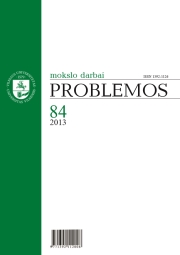KANTAS IR DELEUZE’AS: KOKIA YRA GILIAUSIA VAIZDUOTĖS PASLAPTIS?
KANT AND DELEUZE: WHAT IS THE DEEPEST SECRET OF IMAGINATION?
Author(s): Jūratė BaranovaSubject(s): Philosophy
Published by: Vilniaus Universiteto Leidykla
Keywords: Kant; Deleuze; imagination
Summary/Abstract: The paper discusses the problem of possible philosophical understanding of imagination from the Kantian-Deleuzean point of view. At the begining of his philosophical carreer, one can say, “early Deleuze” in 1963 published the book „Kant’s Critical Philosophy“ (La philosophie critique de Kant). The same year he wrote an essay “The Idea of Genesis in Kant’s Esthetics”. In both texts returning to Kant’s book Critique of Pure Reason, Deleuze notices, that it is widely acknowledged that schematizing is an original and irreducible act of imagination: only imagination can and knows how to schematize. Nevertheless, the imagination does not schematize of its own accord, simply because it is free to do so. It schematizes only for a speculative purpose, in accordance with the determinate concepts of the understanding; when the understanding itself plays the role of legislator. This is why it would be misguided to search the mistery of schematizing for the last word on the imagination in its essence or in its free spontaneity. “Schematizing is indeed a secret, but not the deepest secret of imagination,” – writes Deleuze. Some questions arise at this point. The first one – who speaks here: Kant or Deleuze? The second one – what is this deepest secret of imagination, as an intrigue of this kantian-deleuzean voice? How many possible answers to this question one can discern passing from “early Deleuze” to “late Deleuze”? In this article the author discoved some possible metamorphosis or twists of imagination in the experimental reading of Deleuze. It starts from the submissive position being directed by Understanding or Reason, to the free accord of three independent faculties, towards their discord, even fight, even death of the imagination for the sake of the thought and at least – the whirl closes and comes to the same point but from a different point of view: imagination, together with understanding and reason participate as an integral part of philosophical taste in later Deleuze. But one point united all these different adventures of imagination. Imagination always acts only in relation to the understanding and reason, it never plays free. It could never be able to play alone.
Journal: Problemos
- Issue Year: 2013
- Issue No: 84
- Page Range: 153-169
- Page Count: 17

